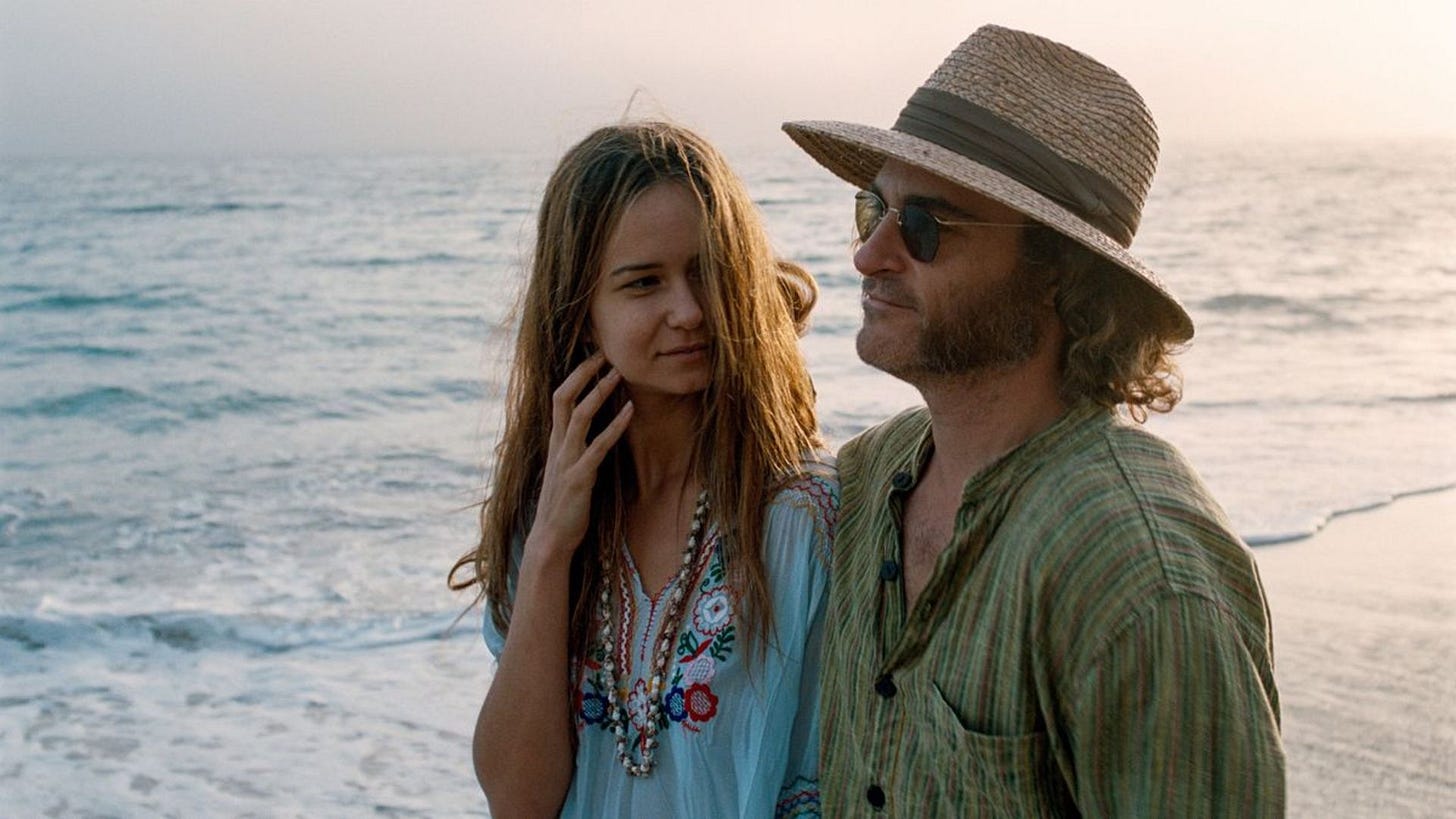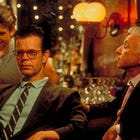
Paul Thomas Anderson’s lucky seventh movie opens in an alleyway leading to a beach and specifically “Gordita Beach, California, 1970” and quickly, the first narration of the film begins:
“She came along the alley, and up the back stairs the way she always used to” before we cut to the blonde haired narrator of our tale and back to her continuing narration “Doc hadn’t seen her for over a year, nobody had. Back then it was always sandals, a flower print bikini and a faded Country Joe and The Fish t-shirt. Tonight she was all in Flatland gear, hair a lot shorter than he remembered. Looking like she swore she’d never look”.
As the first narration of the film ends we cut to a smiling “Shasta Fay Hepworth” (Katherine Waterston) and then immediately to her ex boyfriend and stoner Private Investigator “Larry ‘Doc’ Sportello” (Joaquin Phoenix). The familiarly known “Doc” is smiling, if both a little lost in his own thoughts as well as hugely surprised to see Shasta standing in the corner of his apartment. The word “hallucinating” is used for the first time of many in the film but Shasta needs the Doc’s help and after he jokes he has an office and legitimate business now, Shasta confirms she desperately wanted this “rendezvous” to be a secret between them and rising from the couch, Doc grabs each of them a beer from the refrigerator. Shasta outlines her problem: There’s a man, an affair of the heart and a “grubby little scheme” to which Doc counters and asks “to run off with the hubby’s fortune?” and more importantly, how can he help? As Shasta walks slowly across the room she continues with her predicament, ostensibly stuck in the middle of a dastardly plan to which she has to play on the man’s vulnerability and love for her. As she lights a cigarette, Doc begins musing on this strange and outlandish plan that has fallen into his world and via his ex girlfriend as she smiles and announces “I knew you’d understand”. Doc continues questioning the validity, both morally and ethically, of the plan she has become embroiled with but Shasta replies that it’s “worse than that” and above all it’s about “loyalty” to the man about to be duped. As Doc continues to try rationalising the situation through repeated questions and the all important one of how much Shasta stands to gain she refuses to commit to a figure and that the situation is vastly more complicated than she’s letting on but ultimately the family want the man concerned committed to a “loony bin”. With Shasta now visibly upset, the narration continues once more:
“Back when they were together, she could go weeks without anything more complicated than a pout. Now she’s laying some heavy combination of face ingredients on Doc that he couldn’t read at all. Come to think of it, there’s never been this much sorrow in her voice”.
Lighting a cigarette, Doc responds to Shasta’s questions about dating and confirms he’s seeing a local junior DA before Shasta presses him for his, and her, help. He confirms he’ll try, requesting the names of the “happy couple” (redacted) and Doc can’t help but smile! “You can’t tell anyone about this, Doc” urges a still tearful Shasta and after Doc asks how he can reach her and where she’s currently living, a visibly upset Shasta brushes these questions aside and asks Doc to walk her to her car. Walking towards the car Doc pleads with Shasta and “there’s room here” and “you don’t have to go”.
Shasta drives away.
Cut to the first music of the film and “Inherent Vice” in green, screen filling font, and a return of the film’s narration:
“Doc ran through all the things he hadn’t asked Shasta, like how much she’s come to depend on (redacted) guaranteed level of ease and power and least askable of all, how passionately did she really feel about (redacted)”
A swirling camera angle catches Doc shaking his head in disbelief in the street at this strange turn of events in his life and a bizarre request from an ex girlfriend he hadn’t seen for over a year. He meets a friend in the same alleyway as seen at the beginning of the film before the first ten minutes of the film is wrapped up with this continuing narration:
“Doc knew the likely reply — I love him, what else! With the unspoken footnote that the word these days was being too over used. So when Doc and Dino came in that night it wasn’t just the usual hungry doper thing. It was something else, and with Neptune moving at last out of it’s Scorpio death trip and rising into the Sagittarian light of the higher mind, it was bound to be love related, and I thought I knew what it was”.
I’ve watched Inherent Vice now four, maybe five times and was convinced until recently that I’d already penned my thoughts on the film. Perhaps they’ve been lost to the mists of time through clouds of weed smoke? Who knows? What’s more discombobulating for this particularly unreliable narrator is that I still fail to like/love this film despite my lifelong adoration for all things Paul Thomas Anderson and a director I hold in the highest esteem alongside my cinematic love for the Coen Brothers, his namesake Wes Anderson, Quentin Tarantino, Christopher Nolan, Tim Burton, Michael Mann, Lynne Ramsay, Yorgos Lanthimos and many, many more too numerous to continually name. Similarly, I have a borderline fetish for every film starring Joaquin Phoenix, I could watch Josh Brolin continually eating here in a strangely comic fashion all day long, Benicio del Toro has a beautifully crazy cameo (as does Owen Wilson and Martin Short) and, like Doc, I fall in love with Katherine Waterston every time I see her ethereal beauty on a cinema screen.
Here are some more reasons for loving a film that quixotically I don’t: Jonny Greenwood of Radiohead returns once more with a beautiful musical soundtrack that early in the film reminds me constantly of the Oxford band at their experimental best and a host of original songs including a couple of gems from Neil Young. Alongside numerous awkwardly funny cameo appearances you have a stoner detective living between the blurred lines of his reality and that of the 1970’s world around him and a world containing a “Bigfoot” and a “Wolfman”, a “Golden Fang” and a gang of Nazi White Supremacists and of course he’s definitely “not hallucinating” and still deeply in love with the beautiful Shasta who seemingly forever needs his help.
Based on the 2009 novel of the same name by Thomas Pynchon, Inherent Vice was nominated across the board and in every possible cinema category during the year of 2015 but only director Paul Thomas Anderson (for best film or adapted screenplay) and composer Jonny Greenwood triumphed at movie awards in Boston and Denver, Los Angeles and San Francisco as well as winning the Robert Altman Award at the Film Independent Spirit Awards on 21st February. A day later at the 87th Academy Awards in Los Angeles, both Paul and his costume designer Mark Bridges were nominated in their respective categories of Best Adapted Screenplay and Best Costume Design but both lost out to Graham Moore’s adaptation of “Alan Turing: The Enigma” for the film The Imitation Game and Milena Canonera’s costume design for Wes Anderson’s The Grand Budapest Hotel.
Inherent Vice leaves me wanting more despite not overly enjoying the final hour of the film, but I’ll be watching it again soon enough.
Whilst you’re here I may as well brag about the release of my two recently self-published books. Both are free to read if you subscribe to Amazon Kindle “Unlimited” or reasonably priced in both paperback and hardback. Go on, treat yourself or a loved one and help out an Indie Author! Buy the books if you’re financially able to. They also look far, far better in print!
We HAVE to keep the spirit of reading books alive and well.
Thanks.
"still life, with gooseberry" - link to Amazon
"Rasputin and Raspberry Jam" - link to Amazon
Thanks for reading. I hope this message in a bottle in The Matrix finds you well, prospering, and the right way up in an upside down world.











Bought the blu ray
Back in the day
But never watched it
Big Pynchon fan
V and Gravity's Rainbow